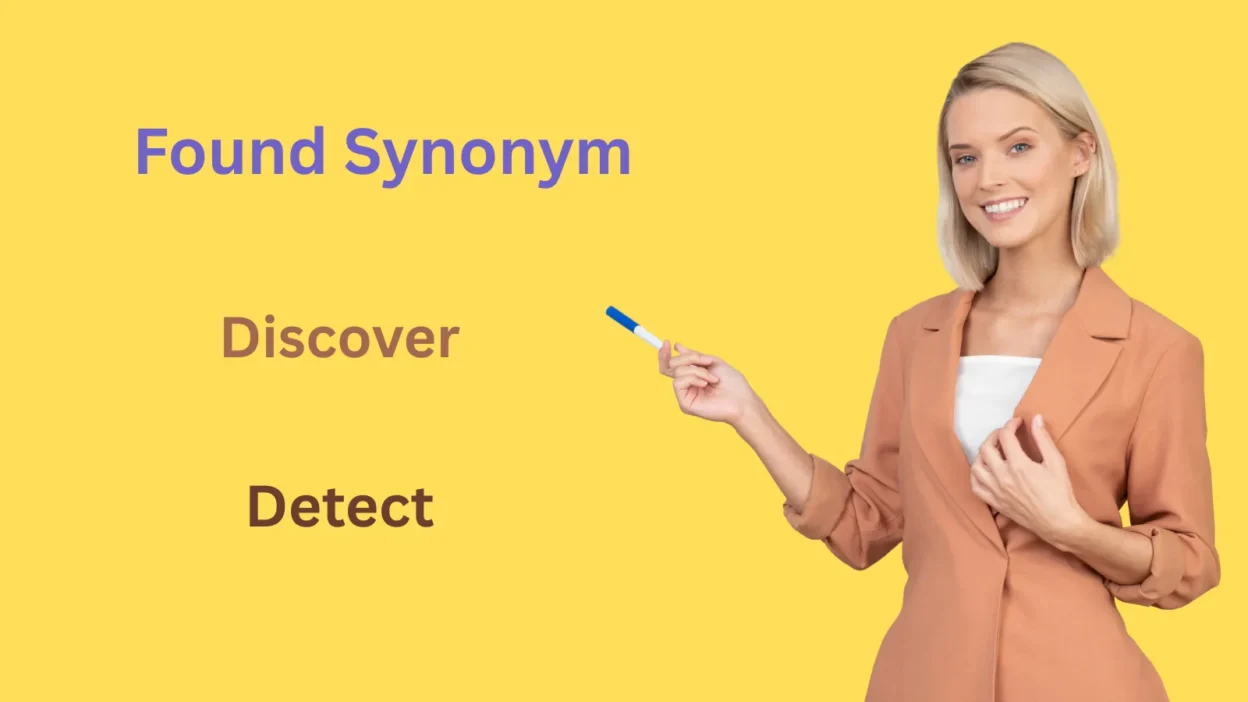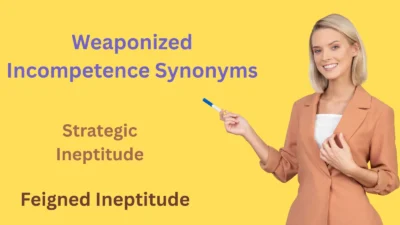Found synonym refers to alternative words that replace “found,” depending on its meaning — whether you’re talking about discovering, creating, or realizing something. The word found can describe finding a lost item, starting an organization, or uncovering a fact, making it one of English’s most versatile verbs.
Choosing the right synonym for found helps you express precision and tone — from formal writing to emotional storytelling. Some alternatives convey discovery (discover, uncover), while others emphasize creation (establish, create) or realization (realize, learn).
In this article, we’ll explore powerful synonyms of found, their meanings, subtle distinctions, and real-world examples. You’ll also learn how to select the best word based on context, formality, and emotional tone.
Understanding “Found Synonym”
Before exploring the alternatives, let’s clarify its key nuances:
- Discovery sense: “I found my keys under the couch.” → meaning to locate or come across something.
- Establishing sense: “She found a new charity.” → meaning to create or start something officially.
- Realization sense: “He found that the task was harder than expected.” → meaning to learn, perceive, or conclude something.
Each Found synonym below aligns with one or more of these meanings.
1. Discover
Meaning: To find something for the first time.
Example: Columbus discovered America in 1492.
Usage Tip: Use when emphasizing the initial uncovering of something previously unknown.
2. Detect
Meaning: To notice or identify something that’s hidden or subtle.
Example: The scientist detected traces of gas in the sample.
Usage Tip: Common in scientific or investigative contexts.
3. Uncover
Meaning: To reveal or expose something hidden.
Example: They uncovered ancient artifacts during the excavation.
Usage Tip: Perfect for literal or metaphorical discoveries.
4. Locate
Meaning: To find the exact position of something.
Example: She finally located the missing file.
Usage Tip: Emphasizes precision or effort in finding.
5. Identify
Meaning: To recognize or establish what something is.
Example: The police identified the suspect using CCTV footage.
Usage Tip: Best for situations involving recognition or confirmation.
6. Unearth
Meaning: To dig up or bring something hidden to light.
Example: The team unearthed a centuries-old coin.
Usage Tip: Adds a sense of historical or metaphorical depth.
7. Realize
Meaning: To become aware of or understand something.
Example: He realized he had left his phone at home.
Usage Tip: Used for mental discovery, not physical.
8. Determine
Meaning: To discover or establish facts after investigation.
Example: The doctor determined the cause of illness.
Usage Tip: Formal and analytical; suitable for research or logic-based contexts.
9. Discover by chance (come across)
Meaning: To find accidentally.
Example: I came across my old diary while cleaning.
Usage Tip: Informal and natural in everyday English.
10. Encounter
Meaning: To meet or experience something unexpectedly.
Example: He encountered a rare bird during his hike.
Usage Tip: Slightly formal; can apply to people, problems, or discoveries.
11. Recognize
Meaning: To identify something familiar.
Example: I recognized the song as soon as it started playing.
Usage Tip: Common for mental or sensory awareness.
12. Detect
Meaning: To perceive something not easily seen.
Example: The machine detected movement in the room.
Usage Tip: Scientific or technical; adds precision.
13. Reveal
Meaning: To make known what was hidden.
Example: The study revealed new insights about behavior.
Usage Tip: Excellent for formal writing and research contexts.
14. Establish
Meaning: To found or start something formally.
Example: He established a nonprofit organization in 2010.
Usage Tip: Use when referring to creation, not discovery.
15. Initiate
Meaning: To begin or set in motion.
Example: The CEO initiated a new training program.
Usage Tip: Suitable for professional or structured beginnings.
16. Create
Meaning: To bring something into existence.
Example: They created a sustainable energy project.
Usage Tip: Strong emotional and innovative tone; use when emphasizing originality.
17. Invent
Meaning: To design or produce something new.
Example: Thomas Edison invented the light bulb.
Usage Tip: Perfect for creative or technological contexts.
18. Launch
Meaning: To start or introduce something publicly.
Example: The company launched its new product line last month.
Usage Tip: Common in business or media contexts.
19. Build
Meaning: To construct or develop something.
Example: They built a small business from scratch.
Usage Tip: Emphasizes gradual creation and effort.
20. Form
Meaning: To bring something together or take shape.
Example: They formed a study group before exams.
Usage Tip: Works for teams, organizations, or concepts.
21. Constitute
Meaning: To compose or form the basis of something.
Example: These principles constitute the foundation of democracy.
Usage Tip: Academic or formal writing; abstract or conceptual use.
22. Discover (emotionally)
Meaning: To realize something personal or internal.
Example: She discovered her passion for teaching while volunteering.
Usage Tip: Great for emotional, reflective, or narrative writing.
23. Observe
Meaning: To notice or perceive through careful attention.
Example: He observed the pattern in the data.
Usage Tip: Scientific, academic, or analytical contexts.
24. Detect (repeated intentionally)
Meaning: To find evidence of something hidden or subtle.
Example: The software detected malware on the device.
Usage Tip: Emphasizes precision and technology.
25. Stumble upon
Meaning: To find by accident or coincidence.
Example: We stumbled upon a hidden café in the alley.
Usage Tip: Informal, natural, and conversational.
26. Expose
Meaning: To reveal something secret or hidden.
Example: The journalist exposed corruption in the system.
Usage Tip: Often used in investigative or social contexts.
27. Perceive
Meaning: To become aware of something through the senses or mind.
Example: She perceived a faint smell of lavender.
Usage Tip: Use when emphasizing subtle awareness or intuition.
28. Detect (again, but figurative)
Meaning: To sense or realize emotionally or intuitively.
Example: He detected tension in her voice.
Usage Tip: Adds emotional or relational depth.
29. Invent (metaphorical)
Meaning: To make up or devise something creatively.
Example: She invented an excuse for being late.
Usage Tip: Figurative and playful; not literal discovery.
30. Establish (revisited)
Meaning: To found something permanent or lasting.
Example: He established his reputation through hard work.
Usage Tip: Use when stressing foundation and permanence.
How to Choose the Right Synonym
- Discovery vs. Creation:
- If you find something that already exists → use discover, locate, or uncover.
- If you start something new → use establish, create, or build.
- Accidental vs. Intentional:
- Accidental → come across, stumble upon, encounter.
- Intentional → detect, locate, determine.
- Emotional vs. Analytical:
- Emotional → realize, discover (emotionally), perceive.
- Analytical → determine, observe, identify.
- Tone & Formality:
- Formal → establish, constitute, determine.
- Informal → come across, stumble upon, find out.
Cultural & Emotional Nuances
- “Discover” and “uncover” often carry a tone of excitement or curiosity — common in English storytelling and journalism.
- “Establish” feels stable and professional, often used in corporate or academic English.
- “Stumble upon” adds warmth and spontaneity, fitting in blogs or creative writing.
- “Realize” expresses self-awareness, frequently used in emotional or reflective writing.
Conclusion :
Choosing the right Found Synonym helps you express ideas with clarity and precision. Whether you mean discovering something new, creating an organization, or realizing a truth, each synonym—like discover, establish, or realize—adds its own tone and depth. By understanding these subtle differences, you can make your writing more natural, powerful, and emotionally engaging. Every alternative to found tells a unique story—so select the one that fits your message best.
The richer your vocabulary, the stronger your expression becomes. Mastering Found Synonym usage will elevate your writing style and leave a lasting impression on your readers.





